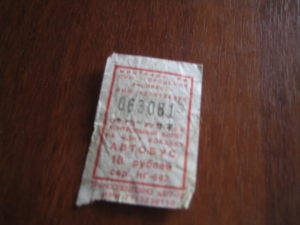I’m not a big fan of Halloween, but it is the time of year when black cats crossing the road and other superstitious ideas seem to take a center stage. Even though I’m not superstitious AT ALL, my Russian friends can be very superstitious and attentive to various omens. Most these omens emerged in the pre-Christian era, and neither the Christianity that arrived in Russia more than 1,000 years ago nor the ideologues of the Communist regime during the 70 years of Soviet rule were able to stamp out some degree of faith in them. If you’re going to live or even travel among Russians, it’s helpful to know what these superstitions mean and how to react to them. In most cases, people adhere to them more as a cultural expectation than a true belief.
The superstitions below are by no means a complete list. Why? Because I am only including the ones I have personally experienced during my visits to Russia. (Note my comments in parentheses.)
Common Russian Superstitions
- Before leaving for a long journey, travelers and all those who are seeing them off, must sit for a moment in silence before leaving the house. Another version of the superstition states that the traveler must sit for a moment on or beside their suitcase. This is a Russian omen for a safe journey. Everyone in the house must sit somewhere for a minute. This omen, incidentally, is very useful, because it helps people to calm down after the chaos and remember whether they have forgotten to pack anything. (The first time this happened to me, I had no clue what was going on. I was actually a bit frightened.)
- Knocking on wood is practiced in Russia as in other countries. However, Russians tend to add a symbolic three spits over one’s left shoulder or simply with the head turned to the left, and Russians will often knock three times as well. Traditionally one was spitting on the devil, who is always on the left. (When I’ve seen this done, the person didn’t actually spit—but just made a spitting sound, something like our “P-too-ey.”)
- It is bad luck to use physical hand gestures to demonstrate something negative using oneself or someone else as the object. For example, when describing a scar you saw on someone’s face, you should not gesture on your own face or another person’s. It’s okay to demonstrate in mid-air. If one does it without realizing, it can be countered by making a hand motion toward the body part used and then an abrupt motion away, as if to pick up the bad energy and throw it away. Or by wiping the area with your hand and then blowing on your hand, as if to wipe off the bad energy and then blow it away. (Yes, must watch those gestures when visiting foreign countries.)
- Birthday parties should be celebrated on or after one’s birthday, not before. So when one’s birthday falls during the week, it’s best to celebrate the following weekend. And never give someone birthday wishes before their birthday. (This can get complicated.)
- Talking about future success, especially boasting about it, is considered bad luck. It is considered better to be silent until the success has been achieved. (Not only success, but also vacations, moves, even small plans, in some cases.)
- Things bought for a newborn baby (such as clothes, toys, furniture, etc.) should only be purchased after the baby is born. This is usually done in a big hurry. (Baby showers are not held in Russia, and yes, people rush about like crazy to purchase what the baby needs after he/she is born.)
- A funeral procession brings good luck. But one should never cross its path or it is bad luck.
- Two or more people should never use one towel at the same time to dry their hands or bodies, or it is said to bring conflict. (Although I have never been directly confronted with this superstition, I have more than once been directed to a specific towel to use – and not to use – when in someone’s home.)
- A stranger should not look at a newborn baby before it is a certain age, i.e. between two months and one year. (I rarely receive photos of my friend’s newborn children or grandchildren, and assume this is the reason. On very rare occasions have I been invited to meet someone’s newborn baby.) Here’s one of them:

- One should not shake hands, hug, or give something over the threshold. (One of my friends practically drags me across the threshold in order to hug me when I arrive.)
- Whistling in a house would bring misfortune to that household. (I think I’ve messed up on this one more than once.)
- Money should not be exchanged hand-to-hand after sundown. If you must give someone money, put it on a table. They can then pick it up. Actually, Russians have a lot of “money” omens. For example, a taxi driver or shop assistant might decline when you try to hand them your money, and ask you to put it on the vehicle’s dashboard or in a special tray next to the till. This does not mean at all that they cannot stomach touching your hands. It is believed that the money can transmit energy from its owner, including negative energy. (I’ve never had a taxi driver refuse to take money from my hand. But the other cases, yep.)
- Odd Number of Flowers – Always give your wife or girlfriend an odd number of flowers. An even number of flowers is for funerals and sympathy. (Count those bouquets!)

- Lucky Tickets -When you receive your bus (or tram/trolley) ticket, if the three numbers on the right add up to the same total as the three numbers on the left its good luck. You should eat the ticket to ensure the good luck. (I have had several lucky tickets, and I keep them in my wallet.)

Traditions for drinking alcohol
- When you have alcohol, it must be drunk until it is gone. (Dangerous if vodka is being served. Not so bad if you have wine or beer, because you can sip it and make it last.)

- One should not put a glass with alcohol back on the table. However it refers only to shot-type strong alcohol which you are supposed to drink at once. Wine, long drink cocktails and beer do not fall under the rule as they are meant to be sipped. (Yes, bottom’s up!)
- Traditionally alcohol is poured out to all the people present, though they are not required to drink. (This is the tradition, but it’s acceptable to refuse.)
- Outgoing guest must drink last glass, so-called “na pososhok” (which we usually call “one for the road.” There, the idea is “for a lucky way.”)
- As a rule, every portion of spirit is accompanied by a touch of glasses and a toast. Funeral and commemoration are exceptions; there the touch of glasses is forbidden. (No clinking during solemn moments.)
- It could be bad luck to make a toast with an empty glass. (Even putting some juice in your empty glass is enough to fulfill the rule.)
- It is considered bad luck to put an empty bottle back on the table when it’s finished. (Watch your step when you get up from the table! There could be several bottles lying on the floor.)
“Cause and effect” Russian superstitions
- If it’s raining when you leave a place, it means you’ll return, and it is considered a generally good omen.
- If it rains on someone’s wedding, it means they’ll be wealthy.
- If someone sneezes while telling something, it means he or she is telling the truth. (One of the responses to someone sneezing is to say “Pravda!” which means “truth.”)
- If one or more birds poop on you or your property (commonly cars), it’s good luck, and may bring you riches.
- If you find yourself standing between people with identical names, you should make a wish and it will come true. (In Russia, because names are almost always of Russian origin, this could easily happen.)
If it seems to you that keeping track of all these superstitions could be a nuisance and cause a lot of inconvenience, you are right! And Russians feel the same way. But the superstitions (and the “power” they seem to wield) are passed on from generation to generation—and are simply part of what it means to be Russian.
In truth, foreigners are not expected to know these ancient ideas, nor abide by them. Nevertheless, for me, it’s good to be aware. To know who is more prone to adhering and who couldn’t care less. And to embrace the culture of my second home regardless of how mystifying it can be.












Leave a Reply